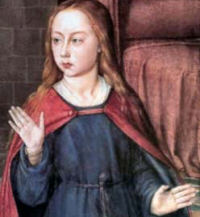» Enjoy our Liturgical Seasons series of e-books!
Again Lent's austerity is interrupted as we solemnly keep a feast in honor of the Annunciation. The Annunciation is a mystery that belongs to the temporal rather than to the sanctoral cycle in the Church's calendar. For the feast commemorates the most sublime moment in the history of time, the moment when the Second Divine Person of the most Holy Trinity assumed human nature in the womb of the Virgin Mary. Thus it is a feast of our Lord, even as it is of Mary, although the liturgy centers wholly around the Mother of God. — The Church's Year of Grace, Pius Parsch
Today is also the historical feast of St. Dismas, the good thief and St. Margaret Clitherow, wife and mother who was one of the English martyrs.
The Annunciation
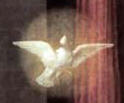 A tradition, which has come down from the apostolic ages, tells us that the great mystery of the Incarnation was achieved on the twenty-fifth day of March. It was at the hour of midnight, when the most holy Virgin was alone and absorbed in prayer, that the Archangel Gabriel appeared before her, and asked her, in the name of the blessed Trinity, to consent to become the Mother of God. Let us assist, in spirit, at this wonderful interview between the angel and the Virgin: and, at the same time, let us think of that other interview which took place between Eve and the serpent. A holy bishop and martyr of the second century, Saint Irenaeus, who had received the tradition from the very disciples of the apostles, shows us that Nazareth is the counterpart of Eden.
A tradition, which has come down from the apostolic ages, tells us that the great mystery of the Incarnation was achieved on the twenty-fifth day of March. It was at the hour of midnight, when the most holy Virgin was alone and absorbed in prayer, that the Archangel Gabriel appeared before her, and asked her, in the name of the blessed Trinity, to consent to become the Mother of God. Let us assist, in spirit, at this wonderful interview between the angel and the Virgin: and, at the same time, let us think of that other interview which took place between Eve and the serpent. A holy bishop and martyr of the second century, Saint Irenaeus, who had received the tradition from the very disciples of the apostles, shows us that Nazareth is the counterpart of Eden.
In the garden of delights there is a virgin and an angel; and a conversation takes place-between them. At Nazareth a virgin is also addressed by an angel, and she answers him; but the angel of the earthly paradise is a spirit of darkness, and he of Nazareth is a spirit of light. In both instances it is the angel that has the first word. 'Why,' said the serpent to Eve, 'hath God commanded you, that you should not eat of every tree of paradise?' His question implies impatience and a solicitation to evil; he has contempt for the frail creature to whom he addresses it, but he hates the image of God which is upon her.
See, on the other hand, the angel of light; see with what composure and peacefulness he approaches the Virgin of Nazareth, the new Eve; and how respectfully he bows himself down before her: 'Hail, full of grace! The Lord is with thee! Blessed art thou among women!' Such language is evidently of heaven: none but an angel could speak thus to Mary.
Scarcely has the wicked spirit finished speaking than Eve casts a longing look at the forbidden fruit: she is impatient to enjoy the independence it is to bring her. She rashly stretches forth her hand; she plucks the fruit; she eats it, and death takes possession of her: death of the soul, for sin extinguishes the light of life; and death of the body, which being separated from the source of immortality, becomes an object of shame and horror, and finally crumbles into dust.
But let us turn away our eyes from this sad spectacle, and fix them on Nazareth. Mary has heard the angel's explanation of the mystery; the will of heaven is made known to her, and how grand an honor it is to bring upon her! She, the humble maid of Nazareth, is to have the ineffable happiness of becoming the Mother of God, and yet the treasure of her virginity is to be left to her! Mary bows down before this sovereign will, and says to the heavenly messenger: 'Behold the handmaid of the Lord: be it done to me according to thy word.'
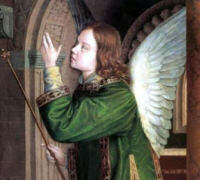 Thus, as the great St. Irenaeus and so many of the holy fathers remark, the obedience of the second Eve repaired the disobedience of the first: for no sooner does the Virgin of Nazareth speak her fiat, 'be it done,' than the eternal Son of God (who, according to the divine decree, awaited this word) is present, by the operation of the Holy Ghost, in the chaste womb of Mary, and there He begins His human life. A Virgin is a Mother, and Mother of God; and it is this Virgin's consenting to the divine will that has made her conceive by the power of the Holy Ghost. This sublime mystery puts between the eternal Word and a mere woman the relations of Son and Mother; it gives to the almighty God a means whereby He may, in a manner worthy of His majesty, triumph over satan, who hitherto seemed to have prevailed against the divine plan.
Thus, as the great St. Irenaeus and so many of the holy fathers remark, the obedience of the second Eve repaired the disobedience of the first: for no sooner does the Virgin of Nazareth speak her fiat, 'be it done,' than the eternal Son of God (who, according to the divine decree, awaited this word) is present, by the operation of the Holy Ghost, in the chaste womb of Mary, and there He begins His human life. A Virgin is a Mother, and Mother of God; and it is this Virgin's consenting to the divine will that has made her conceive by the power of the Holy Ghost. This sublime mystery puts between the eternal Word and a mere woman the relations of Son and Mother; it gives to the almighty God a means whereby He may, in a manner worthy of His majesty, triumph over satan, who hitherto seemed to have prevailed against the divine plan.
Never was there a more entire or humiliating defeat than that which this day befell satan. The frail creature, over whom he had so easily triumphed at the beginning of the world, now rises and crushes his proud head. Eve conquers in Mary. God would not choose man for the instrument of His vengeance; the humiliation of satan would not have been great enough; and therefore she who was the first prey of hell, the first victim of the tempter, is selected to give battle to the enemy. The result of so glorious a triumph is that Mary is to be superior not only to the rebel angels, but to the whole human race, yea, to all the angels of heaven. Seated on her exalted throne, she, the Mother of God, is to be the Queen of all creation. Satan, in the depths of the abyss, will eternally bewail his having dared to direct his first attack against the woman, for God has now so gloriously avenged her; and in heaven, the very Cherubim and Seraphim reverently look up to Mary, and deem themselves honored when she smiles upon them, or employs them in the execution of any of her wishes, for she is the Mother of their God.
Therefore is it that we, the children of Adam, who have been snatched by Mary's obedience from the power of hell, solemnize this day of the Annunciation. Well may we say of Mary those words of Debbora, when she sang her song of victory over the enemies of God's people: ‘The valiant men ceased, and rested in Israel, until Debbora arose, a mother arose in Israel. The Lord chose new wars, and He Himself overthrew the gates of the enemies.’ Let us also refer to the holy Mother of Jesus these words of Judith, who by her victory over the enemy was another type of Mary: 'Praise ye the Lord our God, who hath not forsaken them that hope in Him. And by me, His handmaid, He hath fulfilled His mercy, which He promised to the house of Israel; and He hath killed the enemy of His people by my hand this night. . . . The almighty Lord hath struck him, and hath delivered him into the hands of a woman, and hath slain him.'
—Excerpted from The Liturgical Year, Abbot Gueranger O.S.B.
Highlights and Things to Do:
- Read more about the Annunciation:
- This feast is very important in the defense of the life of unborn children. Even with small children, this is a good day to begin teaching about the high value God places on human life. He loved us so much that he became one of us, took on our human nature and became an innocent, completely dependent infant.
- See the article The Annunciation in Art by Mary F. Nixon Roulet.
- See more online about the place in the Holy Land at the moment of the Incarnation. See Catholic Shrine, Basilica of the Annunciation and Experience the Holy Land Online, Basilica of the Annunciation.
- This is a Solemnity, so when this feast falls during the Lenten season, our Lenten penance obligations are lifted. We should celebrate by some special food or dinner. This feast day forecasts the blessed event of Christmas, and illustrates how the liturgical year is an endless circle of days.
- To celebrate this circle or cycle, serve a cake, coffee rings, or wreath-shaped cookies, or foods shaped in ring molds for this feast day. A perfect symbolic food would be an angel food cake for the archangel Gabriel, baked in a tube pan for the endless circle, decorated with the frosting highlighted with blue for Mary.
- A traditional food for this day is waffles. "Lady Day" or Annunciation, is the only feast of Mary that Sweden still celebrates since the Lutheran faith became the state religion in 1593. In most of Europe, waffles are a traditional feast day food, but on the feast of the Annunciation in Sweden this is THE "Waffle Day" (Vaffeldagen), where waffles are served either for breakfast, lunch or dinner, with lingonberries or cloudberries.
- See Catholic Cuisine for more food ideas for the Solemnity of the Annunciation.
St. Dismas, the Good Thief
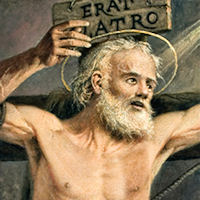 Saint Dismas (sometimes spelled Dysmas or only Dimas, or even Dumas), also known as the Good Thief or the Penitent Thief, is the apocryphal name given to one of the thieves who was crucified alongside Christ according to the Gospel of Luke 23:39-43:
Saint Dismas (sometimes spelled Dysmas or only Dimas, or even Dumas), also known as the Good Thief or the Penitent Thief, is the apocryphal name given to one of the thieves who was crucified alongside Christ according to the Gospel of Luke 23:39-43:
And one of the malefactors which were hanged railed on him, saying, "If thou be Christ, save thyself and us."
But the other answering rebuked him, saying, "Dost not thou fear God, seeing thou art in the same condemnation? And we indeed justly; for we receive the due reward of our deeds: but this man hath done nothing amiss."
And he said unto Jesus, "Lord, remember me when thou comest into thy kingdom."
And Jesus said unto him, "Verily I say unto thee, today shalt thou be with me in paradise."
Patronage: Those condemned to death; prisoners and repentant thieves; antique dealers; condemned prisoners; death row prisoners; dying people; funeral directors; gravediggers; hanged men; penitent criminals; prison chaplains; prisoners; prisoners on death row; prisons; reformed thieves; undertakers; archdiocese of Przemysl, Poland; Merizo, Guam; San Dimas, Mexico
Symbols and Representation: man carrying his cross immediately behind Christ; man crucified at Christ’s right hand; naked man, holding his cross, often with his hand on his heart to signify penitence; tall cross; wearing a loincloth and either holding his cross or being crucified; sometimes depicted in Paradise.
Highlights and Things to Do:
- Read more St. Dismas:
- Read about the St. Dismas Guild Prison inspired by Mother Teresa.
- Purchase and read a copy of The Life of the Good Thief.
St. Margaret Clitherow
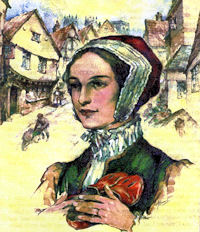 St. Margaret is considered the first woman martyred under Queen Elizabeth's religious suppression. Margaret was raised a Protestant but converted to Catholicism about two to three years after she was married. According to her confessor, Fr. Mush, Margaret became a Catholic because she "found no substance, truth nor Christian comfort in the ministers of the new church, nor in their doctrine itself, and hearing also many priests and lay people to suffer for the defense of the ancient Catholic Faith." Margaret's husband, John Clitherow, remained a Protestant but supported his wife's decision to convert. They were happily married and raised three children: Henry, William, and Anne. She was a businesswoman who helped run her husband's butcher shop business. She was loved many people even her Protestant neighbors.
St. Margaret is considered the first woman martyred under Queen Elizabeth's religious suppression. Margaret was raised a Protestant but converted to Catholicism about two to three years after she was married. According to her confessor, Fr. Mush, Margaret became a Catholic because she "found no substance, truth nor Christian comfort in the ministers of the new church, nor in their doctrine itself, and hearing also many priests and lay people to suffer for the defense of the ancient Catholic Faith." Margaret's husband, John Clitherow, remained a Protestant but supported his wife's decision to convert. They were happily married and raised three children: Henry, William, and Anne. She was a businesswoman who helped run her husband's butcher shop business. She was loved many people even her Protestant neighbors.
Margaret practiced her faith and helped many people reconcile themselves back into the Catholic Church. She prayed one and a half hours every day and fasted four times a week. She regularly participated in mass and frequently went to confession. When laws were passed against Catholics, Margaret was imprisoned several times because she did not attend Protestant services. Other laws were passed which included a 1585 law that made it high treason for a priest to live in England and a felony for anyone to harbor or aid a priest. The penalty for breaking such laws was death. Despite the risk, Margaret helped and concealed priests. Margaret said "by God's grace all priests shall be more welcome to me than ever they were, and I will do what I can to set forward God's Catholic service."
Margaret wanted her son Henry to receive a Catholic education so she endeavored that her son be sent outside the Kingdom to Douai, France for schooling. Such an act was considered a crime. When the authorities discovered their intention, the Common Council had the Clitherow house searched. They initially found nothing but later retrieved religious vessels, books and vestments used for Holy Mass. They also found a secret hiding place but no renegade priests. Still, Margaret was arrested. Margaret refused to plead and to be tried saying, "Having made no offense, I need no trial." English law decreed that anyone who refused to plead and to be tried should be "pressed to death." So on the morning of March 25, 1586, after sewing her own shroud the night before and after praying for the Pope, cardinals, clergy, and the Queen, Margaret was executed. She lay sandwiched between a rock and a wooden slab while weights were dropped upon her, crushing her to death. She did not cry out but prayed "Jesu, Jesu, Jesu, have mercy upon me." She died at age 30.
Moved by her saintly life, all her children entered the religious life. Anne became a nun. Henry and William both became priests.
On October 25, 1970, Pope Paul VI declared Margaret a saint.
—Excerpted from Savior.org
Patronage: businesswomen; converts; martyrs
Symbols and Representation: Elizabethan houswife kneeling or standing on a heavy wooden door
Highlights and Things to Do:
- Read more about St. Margaret:
- Visit this page which has a poem by Gerard Manley Hopkins about St. Margaret Clitheroe.
- Read about the secret resting place of Margaret Clitherow.
- If you are visiting York here is a link to Margaret Clitherow's House with the address and directions.
- Read A Good Friday Saint: Margaret Clitherow, the Pearl of York at the National Catholic Register.


